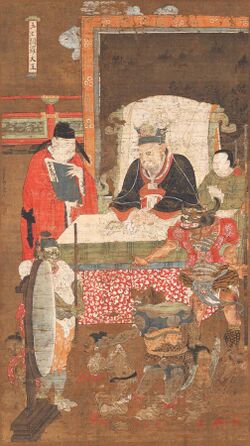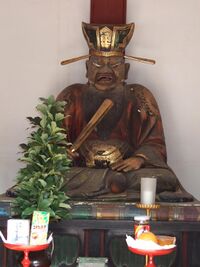Religion:Yanluo Wang

Yanluo Wang or Yamla (Chinese: 閻羅王; pinyin: Yánluó Wáng; Wade–Giles: Yen-lo) is a deity in Chinese religion and Taoism, and the one of official judge in Youdu, the underworld. The name Yanluo is a shortened Chinese transliteration of the Sanskrit term Yamarāja (閻魔羅社). He is the fifth judge in the court of underworld and passes judgment on all the dead.
According to legend, he is often equated with Yama from Buddhism, but actually, Yanluo Wang has his own number of stories and long been worshiped in China. His personification is always male, and his minions include a judge who holds in his hands a brush and a book listing every soul and the allotted death date for every life. Bullhead and Horseface, the fearsome guardians of hell, bring the newly dead, one by one, before Yanluo for judgement. Men or women with merit will be rewarded good future lives, or even revival in their previous life. Men or women who committed misdeeds will be sentenced to torture and/or miserable future lives.
Adoption by Taoism and folk religion

Drawing from various India texts and local culture, the Chinese tradition proposes several versions concerning the number of hells and deities who are at their head. It seems that originally there were two competing versions: 136 hells (8 big ones divided into 16 smaller ones) or 18 hells, each of them being led by a subordinate king of Yanluo Wang.
They were strongly challenged from the Tang dynasty by a new version influenced by Taoism, which adopted Yanluo Wang to make it the fifth of a set of ten kings (Shidian Yánluó wáng 十殿阎罗王, Guardian king-sorter of the ten chambers) each named at the head of a hell by the Jade Emperor. The other nine kings are: Qinguangwang (秦广王), Chujiangwang (楚江王), Songdiwang (宋帝王), Wuguanwang (五官王), Bianchengwang (卞城王), Taishanwang (泰山王), Pingdengwang (平等王) Dushiwang (都市王) Zhuanlunwang (转轮王), typically Taoist names. They compete with Heidi, another Taoist god of the world of the dead. Yanluo Wang remains nevertheless the most famous, and by far the most present in the iconography.[1]
However, then it disappears completely from the list, giving way to a historical figure, a magistrate appointed during his lifetime as judge of the dead by a superior deity. This magistrate is most often Bao Zheng, a famous judge who lived during the Song dynasty. Sometimes he is accompanied by three assistants named "Old Age", "Illness" and "Death".[2]
He is also regarded as one of the Twenty Devas (二十諸天 Èrshí Zhūtiān) or the Twenty-Four Devas (二十四諸天 Èrshísì zhūtiān), a group of protective dharmapalas, in Chinese Buddhism.[3]
Variable identity
In the syncretistic and non-dogmatic world of Chinese religious views, Yanluo Wang's interpretation can vary greatly from person to person. While some recognize him as a Buddhist deity, others regard him as a Taoist counterpart of Bodhisattva Kṣitigarbha. Generally seen as a stern deity, Yanluo Wang is also a righteous and fair Supreme Judge in underworld or skillful advocate of Dharma.
See also
- Cheng Huang Gong (城隍公)
- Heibai Wuchang (黑白无常)
- King Yama, Buddhist counterpart of Yanluo Wang
- Kṣitigarbha (地藏王)
- List of death deities
- Meng Po (孟婆)
- Ox-Head and Horse-Face Guards (牛头马面)
- Zhong Kui (钟馗)
Citations
- ↑ Chenivesse, Sandrine (1998). Fengdu : cité de l'abondance, cité de la male mort. pp. 287–339. https://www.persee.fr/doc/asie_0766-1177_1998_num_10_1_1137.
- ↑ "酆都鬼城與道教有何關係 ?" (in Chinese). http://ez-dao.com/daobook/B/qa/(67)%2520-q@a1.htm.
- ↑ A dictionary of Chinese Buddhist terms : with Sanskrit and English equivalents and a Sanskrit-Pali index. Lewis Hodous, William Edward Soothill. London: RoutledgeCurzon. 2004. ISBN 0-203-64186-8. OCLC 275253538. https://www.worldcat.org/oclc/275253538.
General sources
- "阎罗王是如何由来的:钟馗和阎王什么关系-历史趣闻网". lishiquwen.com. http://wap.lishiquwen.com/news/24627.html.
- "道教科仪之十王转案科_斋醮科仪_道教之音_十王转案,十王,冥府,道教科仪,". www.daoisms.org. http://www.daoisms.org/article/sort026/info-16433.html.
ja:閻魔

